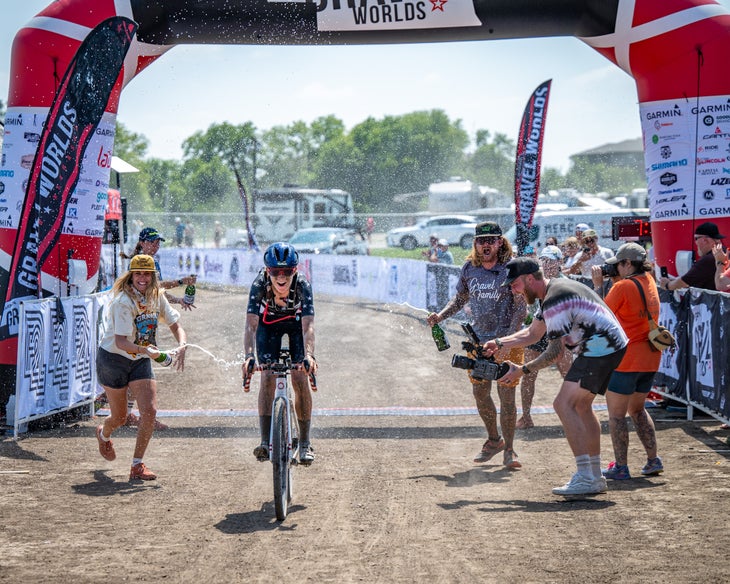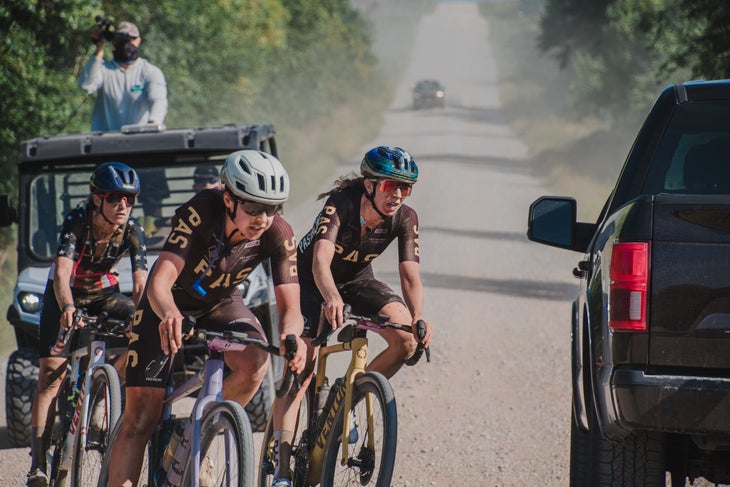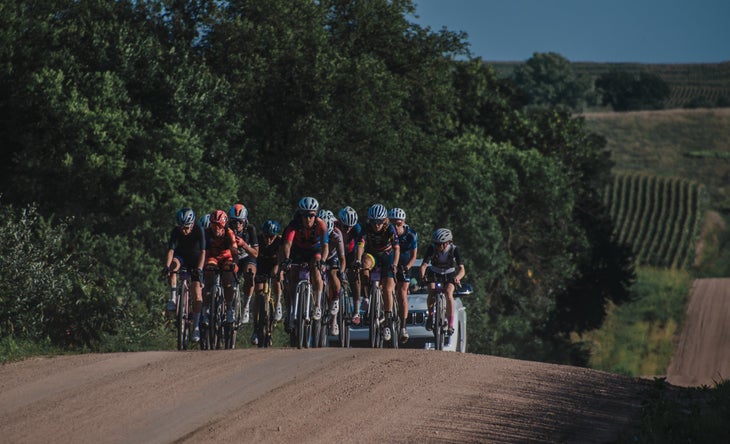Lauf Gravel Worlds 2025 Preview: Earning the Name

Gravel Worlds is a big draw. (Photo: Gravel Worlds/Special to Velo)
Gravel Worlds takes place every year in Lincoln, Nebraska.
Other reports may suggest otherwise, with past races in Italy and Belgium claiming the title in some shape or form, but those reports are wrong.
There is one Gravel Worlds, and it’s been around for more than a decade in Nebraska, well before the UCI Gravel World Championships entered the global calendar in 2022.
While the UCI event, the one that took place in Italy and Belgium, is the one that awards the rainbow jersey, don’t call it Gravel Worlds.
Similar Reads
The organization in Nebraska has that trademarked, no matter how many confused calls of clarity come from naive European-based racers.
“We have worked hard since the beginning to make Gravel Worlds look like the world,” Sofia Gibson said of the race holding onto its name despite the UCI’s entrance into the sport. Gibson is the race’s Assistant Lead Promoter. She works with Jason Strohbehn, Gravel World’s Chief Experience Officer, to make the whole show go.
“Yeah sure, it started as a local event, but immediately people saw potential in what the event could be,” she said.
“With worlds just being in the name, we knew that we had to not only create an event where people could come from all over the world and compete, but something where it could grow into a world-class event where it was worth people’s time, money, and energy to come to little old Lincoln, Nebraska.”
16 editions and counting

Gravel Worlds will race its 16th edition on Saturday, August 23rd, in Lincoln, Nebraska. Along with the premier 150-mile gravel race and two shorter distance events on Saturday, Gravel Worlds is a full three-day weekend.
With a 300-mile ultra race and multiple running races ranging from 50 to 5 kilometers on Friday, to a gravel triathlon on Sunday, the race is adding more and more to its slate.
Additionally, the draw of a massive $100,000 prize purse has attracted a stacked professional field as American and European professionals alike have converged in Lincoln to make a bid for a payday and points for the Gravel Earth Series.
“If you wanna go fast, if you wanna go slow, it’s up to you, but it’s all one event, and so for us we have pride in that name,” Jason Strohbehn said. “It’s made us work to make the event more and more legitimate.
“As far as we know, this year we have the single largest prize pool and gravel. We have the best life coverage, as well. But we also have one of the best last-place parties for when the sun goes down after the pros finish their award ceremony. First to last is how we celebrate a real Gravel Worlds event.”
A shift towards professional racing

Despite Gravel Worlds relatively rich history in the young lifespan of gravel racing, this new normal of many events, separate pro starts, prize money, and live streams is a far cry from the laid-back programming of yesteryears.
One rider who has been there through the throes of the race’s transition in Lincoln, Nebraska, is native John Borstlemann.
Borstlemann moved to Lincoln when he was 12 and stayed for college, winning a collegiate road title for the Nebraska Cornhuskers. Yet, Borstleman is a pro cyclist today because of his gravel racing acumen that was forged at Gravel Worlds of years past.
From his first go at it in 2018, when the race was at a scale that pales in comparison to where it is now, the race has fit like a glove.
“[In my first time] I was racing for third coming into the last roundabout and I missed the last turn,” Borstlemann said. “The guy that I was with started to sprint and we ended up continuing around the roundabout, even though we’re supposed to take the first exit. This is about 100 meters from the finish line and the guy who was chasing us was able to just sneak in and then nab the podium spot.
“So, I almost made it on the podium on my first gravel world, but alas, I did not.”
Seven years later, Borstleman has raced around the world, yet still has a place in his schedule for Gravel Worlds, even if the finish is marked better now. The test for him remains as challenging as ever.
“It is 150 miles in the summer heat of the Midwest and lots of climbing,” he said, reflecting on the main crux of Gravel Worlds as an enduring challenge. “It’s just a repetitive sort of a course that there’s no hiding from the wind, there’s no hiding from the hills, and, despite all the climbing, you never get to coast on the downs. It was a challenge back then, and it is now — even if it takes less time.’
While gravel’s old guard here in America has been playing on the ‘gravel seas’ of eastern Nebraska’s never-ending undulations and ball-bearing shaped gravel, the money has certainly changed things from its place in the international pyramid of gravel events.
Add in the points available for the European-centered Gravel Earth Series, and the result sheet looks set to be split between riders based in America and those crossing the Atlantic for a stab at Gravel Worlds glory.
“I knew it’s been around a while, it was a race I was familiar with, but I guess I never saw it as this big, huge race until this year,” Morgan Aguirre said.
Aguirre is American, but is based in Girona. This positions her in a position where she straddles the two sides of gravel racing that sometimes, although not frequently, classes at the biggest events of the year.
Now, with Aguirre leading the Gravel Earth Series points table, that includes a stop in Lincoln.
“They had an effort to get a bunch of women to the race and obviously huge prize money. Now it is a big, huge deal as they really tried to shore up the competitive side of things.
“It feels a lot like Unbound. It just seems like, because of the prize money, it just sort of naturally seems like a big race that people don’t want to miss. It sort of seems natural that everyone would be here. Anytime you put a lot of money on the line, pros are going to show up and do what they can.”
More than just the money

In the American racing landscape, Gravel Worlds decision to put up the largest prize pool to get pros to circle their date on the calendar is enough for many to make the trip.
Yet, for those who have been entrenched in the gravel game for a while, the race has a deeper meaning, especially for those who have tasted success at a race that always brings strong riders to a course that is deceptively difficult.
“I wouldn’t have much of a career if it weren’t for Gravel Worlds and my success there in the past,” Borstleman said. Borstleman is in the midst of a campaign to make the U.S. national team pursuit squad for the 2028 Olympics and is racing track nationals on Thursday in Colorado Springs before Gravel Worlds on Saturday.
Yet, even with those ambitions, he is only in a position to battle for a place on the national team because of his past success at Gravel Worlds, among other events.
“It’s an event that holds a very special place in my heart, and it’s something that I want to be even as I train for track racing. If it was just another gravel race to me, then yeah, maybe trying to squeeze it into this busy weekend with track nationals going on, maybe I would try to find a way to skip it, but it’s much more than just another gravel race to me.”
For Borstelmann, it is Gravel Worlds, regardless of what the UCI has to say about it.
“When I first raced it in 2018, it was one of the top three most prestigious and best-attended gravel races in the region, if not in the country,” he said of his time racing the ‘gravel seas’ of Nebraska.
“Anybody who wanted to race gravel would have this on their radar. It was never an official world championship, but the people who were gravel racers did see it as a pseudo world championship at least.”
While riders newer to the sport, like Morgan Aguirre, have grown to see the power of the race due to where it is now, Gravel Worlds authority in the space has been gained by more than just the prize purse.
It has been gained by word of mouth, and the grass-roots impact the corn fields of Lincoln have had on the roots of the sport that can warrant professional prize purses. The money, in essence, has been earned, not given — just as the name Gravel Worlds is much more about the race’s community legacy than any official distinction.
“I would love to see the Lincoln, Nebraska, Gravel Worlds be the, if not the official world championship of gravel bike racing, then at least be seen that way in the eyes of the average gravel racer.
“The weight of the influence of the UCI is gonna be pretty hard for a local organization, especially when they can draw talent like Van Der Poel, but I think for the community and the race organizers, it’s very important to most folks to retain that name.”
Then again, regardless of what the world thinks, Gravel Worlds is fine if others don’t get it. Gravel Worlds was there first, it was named for a reason, and it isn’t going anywhere anytime soon.
“We’re focused on ourselves,” Strohbehn said. “We are not trying to compare ourselves to other events of any kind.”


